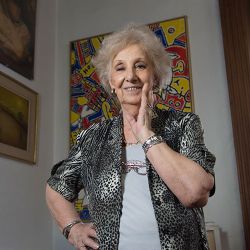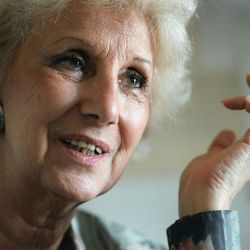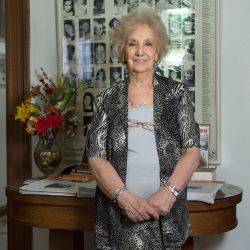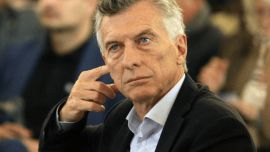Estela de Carlotto’s story as a human rights activists began in late 1977 when her daughter Laura was kidnapped by a military death squad. In 1978, Carlotto learned that her daughter had carried a pregnancy through April that year. She joined the Grandmothers of Plaza de Mayo, a burgeoning group of women who, in the shadows of a criminal military dictatorship, had begun searching for the babies and toddlers of their missing daughters and daughters-in-law.
In 2014, almost 40 years later, Carlotto found her missing grandson Guido.
“I’m his grandmother so I visit him, I make him pastafrolas,” she tells the Times, in a casual interview at the Grandmothers’headquarters in downtown Buenos Aires where most days there are just two grandmothers : Carlotto, the organisation’s historic president, and the little-known but tireless Buscarita Roa.
“Another three come for our weekly meeting,” Carlotto explains. “We can’t stop. Even though the five of us have found our own grandchildren, there are many more to find. And we want to leave things as best we can, so the past doesn’t repeat itself.”
In 2018, Carlotto says “she’s busier and more concerned than ever.” The change of government has meant a dramatic shift in the Grandmothers’ access to places of power. They have also born the brunt of criticisms that their organisation was too close to the former Kirchner presidents, Néstor and Cristina. “Our visits to speak with Armed Forces cadets no longer happen. That’s a step backwards,” Carlotto tells the Times. “It’s the first time we have a president who doesn’t even send a card of congratulations when we find a new grandchild,” she says.
Today, she is highly critical of President Mauricio Macri who had initially refused to meet with human rights organisations after taking power: “He eventually did organise a meeting but only because (former French president François) Hollande wanted to see us.”
Is there a plan in place for the Grandmothers of Plaza de Mayo, when the grandmothers themselves are no longer alive to run the organisation?
Yes, because we’re old, many of the Grandmothers are sick or have died. The grandchildren — the recovered ones as well as our our family members — will continue our work.
They will form part of a committee, a more complex committee than the current one, to continue with our search for grandchildren, applying our same respectful work methods, which is to not judge or condone people we shouldn’t, or to make mistakes in what we do; and to continue working toward greater scientific advancement so that DNA can ensure future discoveries of grandchildren.
How do the Grandmothers handle situations where a person does not wish to be found or refuses to confront his or her true identity?
We receive information, sometimes anonymously. In these cases, the person receives a visit from one of our teams.
The response can vary, sometimes they shut the door in our faces. If the response is totally negative after two or three attempted visits, we cannot just say: “Well, if he or she doesn’t want to know, let’s leave it there.” We have a legal obligation to report the case when there are grounds to believe this person is a grandchild of disappeared parents. So we do, then the Judiciary acts accordingly.
But the priority is to establish a relationship so that the person deals directly with the Grandmothers?
That’s right, to establish a cordial relationship without having to go to court. Nothing traumatic, rather the chance to come to this house where they’re welcomed by young people like them, where they can talk openly with no pressure. Our saying here among the Grandmothers is: “Be patient with them.”
Why would some grandchildren refuse to establish a relationship with their biological families?
Many were treated quite poorly as kids, since most of them were raised by the same people who murdered their parents, very cruel people. But in cases where they were treated well, those kids feel affection. We have to explain to them what kind of crime was committed against them when their parents were killed and when they were stolen by people whose aim was to raise them differently, with different ideas, with hatred toward the political philosophies of their parents. Some are even harassed by the people who raised them: “If you go to court, then we go to jail.” They turn the victim into the victimiser.
How has technology changed the way your search for missing grandchildren?
I’m totally useless with technology. There are other Grandmothers who use their computers like young people. But they’re slaves to technology, it’s like an addiction. “Look up at the sky, at the plants,” I tell them. But we have to accept it because it has helped us enormously.
Is the human rights movement paying a price for its close ties with the administrations of former presidents Néstor Kirchner and Cristina Fernández de Kirchner?
I think the current government [of Mauricio Macri] is paying a price when it pushes this idea that we were used by the Kirchners, or when they treat us like fools. We did not subordinate ourselves to the needs of the previous governments, instead we did what we felt was best for us as organisations. It annoys us when they say we were used.
I think the current government is going to pay a cost for that because they know who we are. If we could take on [former dictator Jorge] Videla, how could we be used by anybody? When we have to protest, we protest. But if during the previous [Kirchner] governments there was nothing to protest, then that’s because of the actions of those governments.
Some people, including those from within the human rights movement, say organisations like yours sacrificed their independence by establishing such a strong relationship with the Kirchners. How do you respond?
I don’t agree. From the very beginning of our struggle, we tried to establish dialogue with all governments, including the de-facto military regime. These were pathways toward truth and justice not negotiations. We met with [former presidents] [Raúl] Alfonsín, [Carlos] Menem, [Eduardo] Duhalde.
To our surprise, when Néstor Kirchner came to power he welcomed us to Government House for a large and extended meeting where each organisation was able to express their respective institutional demands. He said: “Whatever you need, it has to be done but let’s start with the Judiciary otherwise nothing else can happen.” That was precisely what he did. We established a relationship of friendship and open doors with his and Cristina’s governments.
This idea that we were used is an attempt to put us in the category of stupid victims used by a government. If we’re going to use the word “used”, it is the other way around: we used them. We must not also overlook the fact that Néstor [Kirchner] and Cristina [Fernández de Kirchner] were activists of our children’s generation, so the language we speak is the same.
What does it mean for an organisation like the Grandmothers’ to learn about cases of corruption during the previous government given that you were so close?
First of all, the corrupt one in our midst is the current president [Mauricio Macri] who had charges against him and managed to fix things so he could take office. And we know what happened with the National Postal Service, involving his father, and the offshore accounts he has.
What are they trying to do with the former president Cristina? They want to wipe her off the political map, cancel her out, and if they can, take her to prison where we [already] have political prisoners like [former Legal and Technical secretary Carlos] Zannini, who has no case against him aside from a presumption that he could hinder an investigation. These aren’t my theories, it’s what the legal profession is saying. The same applies to [former Planning minister Julio] de Vido and [former vice-president Amado] Boudou, who was recently freed. We also have [Túpac Amaru leader] Milagro Sala, a terrible case.
President Macri initially refused to meet the historic human rights organisations after he came to power, a meeting you yourself had requested. Do you think his government’s record on human rights and human rights policy would be different if there were a better relationship there?
When he campaigned, what did he promise? An end to poverty, the end of polarisation (in Argentina society and politics), the fight against drug-trafficking. We have more poor people than before, the polarisation is stronger than ever because they (in the government) provoke it, persecuting the opposition, and cases of drug-trafficking are growing. So he lied from the beginning.
We hoped he wouldn’t, we said, “Let’s see what he does in human rights,” even with his background as Mayor of Buenos Aires for eight years, in which he never accepted a meeting with us. Something is not working with Macri, a man who goes to Russia to talk about football with Putin. We have growing foreign debt, wages are shrinking. One has to ask, who is this character?
How do you relate to Hebe de Bonafini, the president of the Association of Mothers of Plaza de Mayo, and in what ways do you see yourself as being different?
I have a before and after with Bonafini. We are both mothers, pained by the loss of our children. At the beginning, we knew one another, we worked together, we were all the same. But she changed, and today we have no connection with her because we don’t agree with her habits, her language or her behaviour. I respect her for her pain; she lost two children and a daughter-in-law. I respect her for her struggle because she’s consistent. But I don’t respect her for the way she does things.
What do survivors of the dictatorship and the relatives of its victims, today, want from the Armed Forces?
We want the State to transform them into democratic forces. The idea of an internal enemy, the ‘two demons’ theory and so on, is being encouraged once again. When the Security Minister (Patricia Bullrich) says a police officer or Border Patrol guard should not be judged no matter what he or she does, then she’s giving a free pass to those among them who pull the trigger and ask questions later. It’s a step backward.
What the government did with this man [police officer Luis Chocobar], who shot a criminal from behind, was very strange given he has been charged. What exactly are they trying to do? Inject fear into society? Tell us, “Ladies and gentlemen, take care because anybody here can die if they’re not doing the right thing”?
What do you make of the idea of “reconciliation” which some sectors of Argentine society and its politics have called for?
We reject that concept because we haven’t done anything that requires us to reconcile, nor has anybody come to ask us for forgiveness or tell us the truth. Not only have the culprits [of the dictatorship] refused to confess their crimes, they also say openly that they would do it all again. Reconciliation and forgiveness are banished terms. When they talk to me about forgiveness, I say: “Ask Laura for forgiveness.”
Who are we to forgive? And enough of these comparisons with countries like South Africa where the people are not satisfied with reconciliation, despite the legacy of Nelson Mandela, who was a great man and a hero. It may have served a purpose at the time but forgetting things is not an option.
When we forget, the past repeats itself. It is better to confront things head on, with the truth and with justice.
How is your grandson Guido? What have you discovered in him that reminds you of your daughter Laura, his mother?
We’re still getting to know one another. He’s got a lot of lovely things going on; he built a house, he has a daughter, he’s a musician. But he’s well, putting together the pieces of his personal history like all the grandchildren, the difference being his case was very quick and public.
I see him whenever I like but I don’t wear him out. We care a great deal for one another but neither of us is very affectionate in our personalities. I take him gifts, I make him pastafloras. He’s very much like his father, physically, but he has Laura’s character.





























Comments